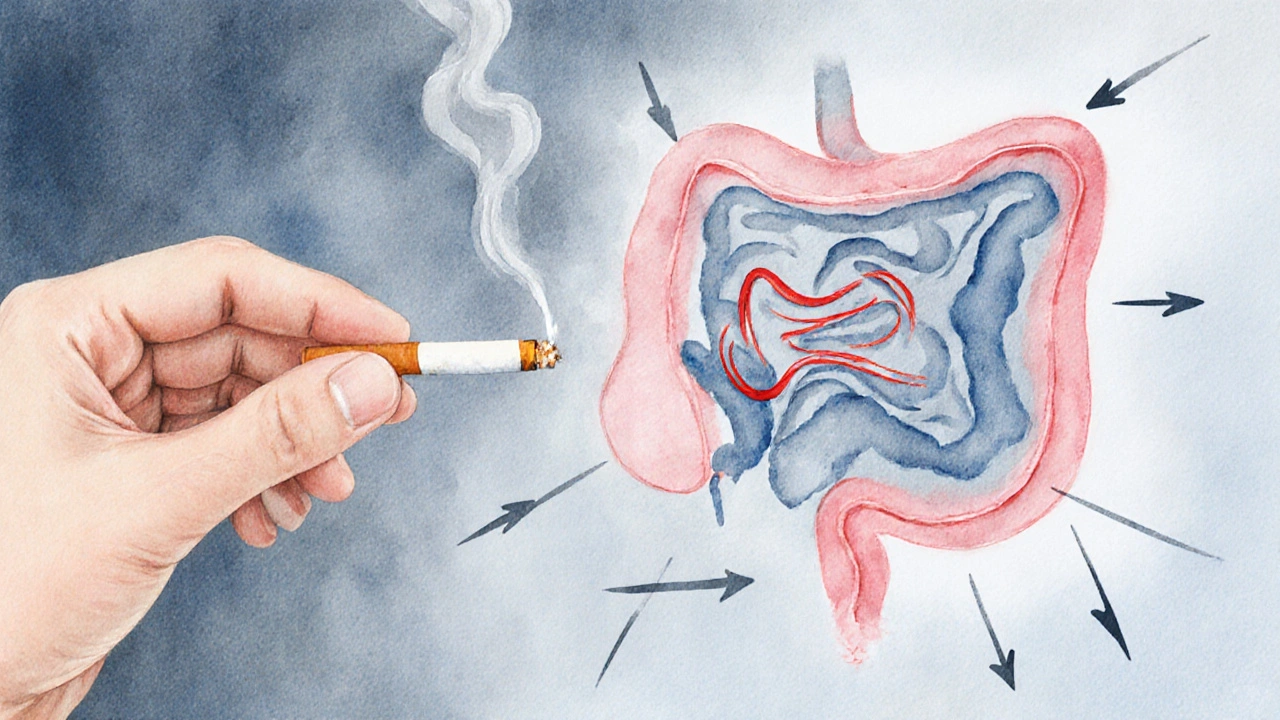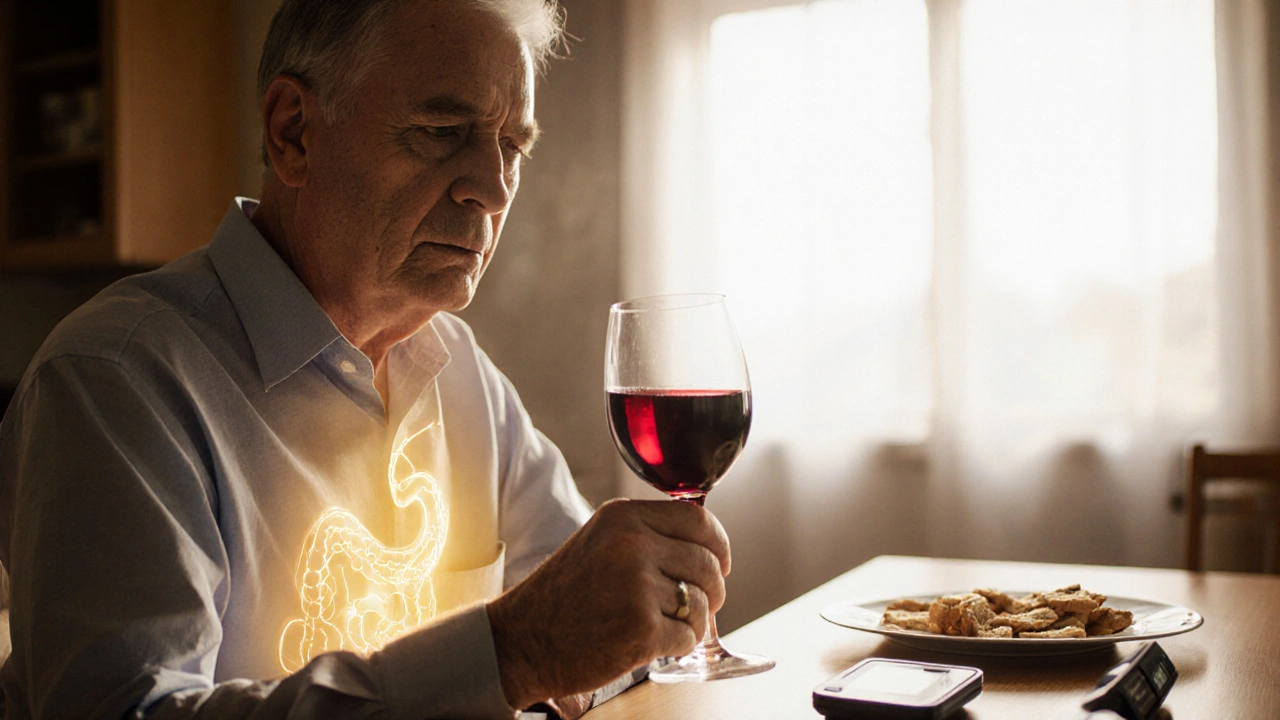Alcohol & Smoking Impact Calculator
Alcohol Impact
Reduces gastric emptying by ~30% and causes blood sugar spikes.
Smoking Impact
Reduces motility by ~20-30% and worsens acid reflux.
Your combined risk level:
| Aspect | Alcohol | Smoking |
|---|---|---|
| Gastric emptying rate | ↓ 30% after 1-2 drinks (short-term) | ↓ 20-30% chronic exposure |
| Blood-glucose variability | Initial ↓ then rebound ↑ (12-hr window) | Indirect ↑ via insulin resistance |
| Acid secretion | Modest increase | Significant increase, worsens reflux |
| Medication absorption | Potential delay due to slower motility | Reduced absorption of pro-kinetics |
| Long-term complication risk | Higher malnutrition risk if frequent | Higher neuropathy & cardiovascular risk |
Living with diabetic gastroparesis is a daily juggling act between blood sugar spikes and a stomach that refuses to empty on schedule. Add a glass of wine or a cigarette, and the balance can tip fast. This guide breaks down exactly how alcohol and smoking mess with stomach motility, blood‑sugar control, and overall health, and gives you real‑world steps to keep the flare‑ups at bay.
Key Takeaways
- Alcohol slows gastric emptying, spikes blood sugar, and can trigger nausea in diabetic gastroparesis.
- Smoking reduces stomach muscle activity, worsens reflux, and interferes with diabetes meds.
- Combined use multiplies risks, leading to higher rates of malnutrition and hospital visits.
- Cutting back, timing drinks, and using nicotine‑free alternatives can sharply improve symptoms.
- Regular monitoring of weight, blood glucose, and symptom diaries helps catch problems early.
Understanding the Core Players
Before diving into the lifestyle culprits, let’s map out the main entities that shape this condition.
Diabetes is a chronic disease where the body can’t properly regulate blood glucose, often requiring insulin or oral agents. When high blood sugar persists, nerves that control the stomach (the autonomic nervous system) can become damaged, leading to gastroparesis, a delayed gastric emptying disorder. In people with diabetes, the condition is called diabetic gastroparesis, marked by nausea, early satiety, bloating, and unpredictable glucose swings.
Two external factors - alcohol, a depressant that interferes with nerve signaling, and smoking, a source of nicotine that constricts blood vessels - directly aggravate these symptoms.
How Alcohol Disrupts Gastric Motility and Blood Sugar
Alcohol’s impact is two‑fold:
- Slowing the stomach. Research from the 2023 International Digestive Disorders Conference showed that a single 150‑ml dose of red wine reduced gastric emptying rate by roughly 30% in diabetic participants.
- Spiking glucose. While moderate amounts may initially lower blood sugar, the liver later releases stored glucose, creating a rebound hyperglycemia that can last up to 12hours.
For someone already battling delayed emptying, the added lag means food sits longer, fermenting into gas and triggering nausea. The glucose roller‑coaster also sabotages insulin dosing, making hypoglycemia or hyperglycemia more likely.
Practical tip: If you choose to drink, keep it under one standard drink (≈14g alcohol), sip slowly, and pair it with a protein‑rich snack. This strategy blunts the gastric slowdown and steadies blood sugar.

Smoking’s Direct Assault on the Stomach
Nicotine binds to receptors in the gastrointestinal tract, causing:
- Reduced smooth‑muscle contractions (peristalsis) - a 20‑30% drop in motility documented in a 2022 New Zealand gastroenterology study.
- Increased acid secretion, worsening reflux that can mimic gastroparesis flare‑ups.
- Impaired blood flow to the stomach wall, which hampers healing and magnifies nerve damage already present from diabetes.
Smoking also interferes with medications like metoclopramide or erythromycin, which rely on normal gastric pH for absorption. The net result is fewer symptom‑relief benefits from prescribed drugs.
Switching to nicotine‑replacement products (patches, gum) can preserve the habit while reducing direct stomach irritation. Evidence shows a 40% improvement in gastric emptying times after six weeks of nicotine‑free cessation.
Combined Effects: When Alcohol and Smoking Meet
Individually, each factor harms gastric function; together, they create a synergy that can double the risk of severe complications such as:
- Malnutrition - due to chronic vomiting and poor nutrient absorption.
- Hospitalization - a 2024 retrospective review of 1,200 diabetic gastroparesis patients found that 22% of admissions were linked to concurrent alcohol and tobacco use.
- Worsening neuropathy - both substances aggravate peripheral nerve damage, feeding back into stomach dysmotility.
Tracking both habits in a symptom diary is a simple yet powerful tool. Note the amount of alcohol, number of cigarettes, meal timing, and symptom severity. Patterns often emerge that guide personalized adjustments.
Practical Strategies to Minimize Harm
Here are evidence‑backed actions you can start today:
- Set clear limits. Aim for ≤1 drink per week and zero cigarettes. The American Diabetes Association recommends complete tobacco cessation for all diabetic patients.
- Schedule wisely. Avoid drinking within two hours of meals; let the stomach settle first.
- Hydrate smartly. Water and electrolyte drinks help flush alcohol metabolites and keep gastric lining moist.
- Use nicotine‑free alternatives. Patches deliver a steady dose that doesn’t hit the stomach directly.
- Adjust medications. Discuss with your doctor whether dosing of pro‑kinetic agents should be shifted after any alcohol intake.
- Monitor weight and labs. Monthly checks of BMI, albumin, and HbA1c reveal early signs of malnutrition or poor control.

Comparison Table: Alcohol vs. Smoking Impact
| Aspect | Alcohol | Smoking |
|---|---|---|
| Gastric emptying rate | ↓ 30% after 1‑2 drinks (short‑term) | ↓ 20‑30% chronic exposure |
| Blood‑glucose variability | Initial ↓ then rebound ↑ (12‑hr window) | Indirect ↑ via insulin resistance |
| Acid secretion | Modest increase | Significant increase, worsens reflux |
| Medication absorption | Potential delay due to slower motility | Reduced absorption of pro‑kinetics |
| Long‑term complication risk | Higher malnutrition risk if frequent | Higher neuropathy & cardiovascular risk |
When to Seek Professional Help
If you notice any of the following, contact your healthcare team promptly:
- Unexplained weight loss >5% in a month.
- Persistent vomiting lasting >24hours.
- Blood glucose readings consistently >250mg/dL or <70mg/dL despite medication adjustments.
- Severe abdominal pain that doesn’t improve with usual diet changes.
Early intervention can prevent hospital stays and preserve nutrition. Your doctor may suggest endoscopic gastric emptying studies, adjust medication regimens, or refer you to a dietitian familiar with low‑residue, high‑protein meals.
Frequently Asked Questions
Can a single glass of wine be safe for someone with diabetic gastroparesis?
Occasional, low‑quantity wine (≤1 standard drink) is less likely to trigger severe delays, especially if taken with a protein snack and after a meal. However, individual tolerance varies, so monitor symptoms closely.
Does quitting smoking improve gastric emptying quickly?
Studies show measurable improvement within 4-6 weeks of complete cessation, with most patients reporting less bloating and nausea after two months.
Are nicotine patches safe for diabetic gastroparesis patients?
Yes, because they deliver nicotine systemically without direct contact with the stomach lining, reducing the risk of aggravating gastric motility.
How often should I check my blood glucose after drinking alcohol?
Check at least every 2hours for the first 12hours post‑drink, and continue regular monitoring if you notice delayed symptoms.
What dietary changes help offset the effects of alcohol and smoking?
Focus on small, frequent meals rich in lean protein, low‑fat dairy, and soluble fiber. Avoid high‑fat or high‑sugar foods that can compound gastric slowing.

Steve Kazandjian
October 7, 2025 AT 15:10